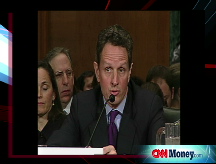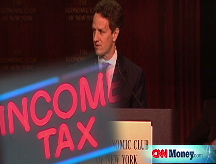Geithner calls for tougher bailout terms
Treasury Secretary nominee tells Senate Finance Committee the greatest risk to the economy is to do too little; apologizes for 'unintentional' tax problems.

NEW YORK (CNNMoney.com) -- Treasury Secretary-designate Tim Geithner called for bold action to blunt the economic downturn and promised to tighten the terms for companies getting federal financial help.
Geithner, appearing at his confirmation hearing Wednesday, also apologized to the Senate Finance Committee for his past underpayment of taxes, but assured senators that the missteps were unintentional.
The comments come as the Senate prepares to consider whether to confirm Geithner as the nation's top financial officer.
The finance committee is set to vote on the nomination in a session that is scheduled to start at 10 a.m. EST Thursday.
Based on comments from committee members during Wednesday's hearing, it appeared unlikely that Geithner would have any problem winning the support of the 21-member committee. The nomination would then go to the full Senate for a vote that hasn't yet been scheduled.
During his prepared remarks, Geithner called on senators to support President Obama's proposed stimulus plan.
"Senators, the ultimate costs of this crisis will be greater, if we do not act with sufficient strength now," Geithner's testimony read. "In a crisis of this magnitude, the most prudent course is the most forceful course."
Geithner - who is currently the president of the Federal Reserve Bank of New York - also advocated "aggressive action to address the housing crisis and to get credit flowing again," though he offered no specifics.
In response to questions at the hearing, Geithner said he expects Obama to go before the nation in coming weeks and lay out what he called a comprehensive plan to address economic and financial weakness.
The hearing comes a day after President Obama took office, only to confront the worst-ever Inauguration Day selloff in the stock market.
The Dow Jones industrial average dropped 4% Tuesday, led by another free fall in bank stocks. The KBW Bank index plunged 20% to its lowest level since 1994, amid worries that big financial institutions such as Citigroup (C, Fortune 500), Bank of America (BAC, Fortune 500) and JPMorgan Chase (JPM, Fortune 500) will require additional federal aid that could wipe out shareholders. Bank stocks bounced back Wednesday but the KBW index remains 40% below its Dec. 31 level.
Geithner said that if confirmed as Treasury secretary, he would work to reform the government's most visible response to the financial sector crisis - the $700 billion financial bailout plan enacted by Congress last fall after September brought the collapse or takeover of six major financial institutions.
The Bush administration's approach to the Troubled Asset Relief Program, or TARP, has become deeply unpopular with legislators and the public.
Many skeptics complain that there was no plan in place to make sure the first $350 billion in government funds were used to boost lending to consumers and businesses.
Geithner said a revised TARP plan will contain "tough conditions to protect the taxpayer and the necessary transparency to allow the American people to see how and where their money is being spent and the results those investments are delivering."
The comments echo those made recently by another top Obama economic aide, National Economic Council chief-designate Larry Summers.
Addressing another prominent concern, Geithner promised to develop a plan to unwind the government's support for financial markets and banks as soon as possible, and to develop a longer-term plan to put the nation on sounder footing fiscally.
The budget deficit is expected to exceed $1 trillion in coming years as tax receipts plunge and federal spending expands to fill the shrinking private sector.
"We need to demonstrate with clear and compelling commitments now, that when we have effectively resolved the crisis and recovery is firmly established, that as a nation, we will return to living within our means," Geithner said.
In addition to asking Geithner about how he plans to address the financial crisis, legislators sought additional detail about Geithner's tax history.
The hearing was originally set for last week, but it was pushed back after it came to light that Geithner - who as Treasury secretary would oversee the IRS - had failed to pay in timely fashion some $34,023 in self-employment taxes between 2001 and 2004.
Chuck Grassley, R-Iowa, the ranking member of the committee, said he was weighing the risks tied to the problems in the economy against what he called the "troubling fact" that Geithner didn't pay some of his back taxes until the Obama camp was preparing to nominate him for Treasury secretary.
Geithner replied in his opening remarks that "these were careless mistakes, they were avoidable mistakes, but they were unintentional."
There was little sign in morning questioning that the tax issue would become an issue for Geithner's confirmation.
Sens. Jeff Bingaman, D-N.M., and John Kerry D-Mass., told Geithner they would support his nomination. Meanwhile, some notable Republicans, including Sens. Orrin Hatch, R-Utah, and Olympia Snowe, R-Maine, focused their questions on policy issues.
Hatch asked about corporate taxes while Snowe questioned Geithner about the role of regulators in the collapse of Lehman Brothers.
"You're going to be confirmed," said Sen. Pat Roberts, R-Kan, who noted nonetheless that his phone lines had "lit up" with constituents who were angry about the nominee's tax problems.
One senator who said he had "serious reservations" about Geithner's nomination was Jim Bunning, R-Ky. Bunning said Geithner had failed to provide "a satisfactory explanation" of his tax problems and charged he had been a major player in the "flawed" financial rescue efforts of the past year.
Sen. Jon Kyl, R-Ariz., also questioned Geithner's explanation for his tax missteps.
Though as head of the Treasury Geithner would oversee the IRS, many observers have dismissed the tax questions as paling in comparison to the need to address the crisis in the economy and financial markets.
"I'm interested in hearing his explanation for the tax stuff, but that's minor next to the other issues," said New York University finance professor Roy Smith. "What I want to know is what he's learned from the first half of the TARP." ![]()



